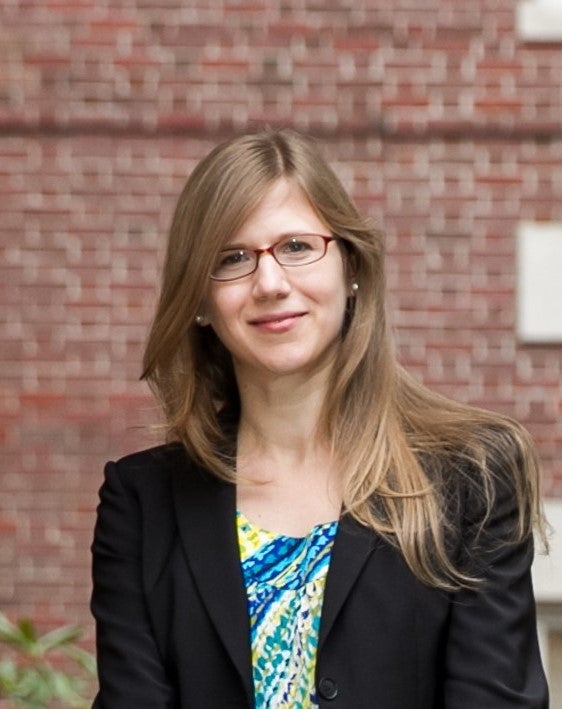Anna Lvovsky ’13 is being promoted to professor of law at Harvard Law School, effective July 1. A scholar of criminal law and procedure, legal history, and evidence, she joined the faculty as an assistant professor in 2017.
“Anna Lvovsky is an extraordinary scholar whose work casts a bright light on the history of police surveillance of the LGBTQ+ community as well as on contemporary issues about the institutional dynamics between police and the courts,” said John F. Manning ’85, the Morgan and Helen Chu Dean and Professor of Law at Harvard Law School. “Through the creativity and clarity she brings to her teaching and writing, Professor Lvovsky greatly enriches our students’ learning experience.”
Lvovsky, whose research focuses on the legal and cultural dimensions of policing, the regulation of gender and sexuality, and judicial uses of professional knowledge, recently published “Vice Patrol: Cops, Courts and the Struggle Over Urban Gay Life Before Stonewall” (University of Chicago Press), which examines legal and cultural battles surrounding the policing of gay communities in the United States. “Vice Patrol” was this year’s finalist for the David J. Langum Sr. Prize in American legal history and is now a finalist for the Lambda Literary Award in LGBTQ Studies. As a dissertation, it received the 2016 Julien Mezey Dissertation Award from the Association for the Study of Law, Culture, and the Humanities.
Lvovsky’s articles, focusing on both historical and contemporary police practices, have explored the institutional and legal legacies of police reform, most notably the significance of police expertise in court. Her work has appeared in the Harvard Law Review, the Yale Law Journal, the University of Pennsylvania Law Review, and the Journal of Urban History.
A legal historian, Lvovsky received a Ph.D. in the History of American Civilization from Harvard University in 2015. At the start of her graduate studies, she discovered in the library policing manuals that revealed the ways police officers identified and surveiled what they considered sexual “deviance” in the mid-20th century. Her decision to write on law enforcement also influenced her decision to attend Harvard Law School.
“Harvard Law is where I first learned to love the study of the law, and every semester my interactions with our wonderful students, staff, and faculty remind me why that was,” said Lvovsky. “I am thrilled to make this extraordinary community my academic home.”
At Harvard Law, Lvovsky teaches courses on evidence and criminal law that invite students to focus on the cultural context and downstream effects of seemingly neutral legal rules. She has taught seminars and reading groups on the history of policing and intimate governance, and currently co-convenes the law school’s legal history workshop.
Lvovsky earned a B.A. in literature and intellectual history in 2007 from Yale University, where she graduated summa cum laude. She graduated magna cum laude from Harvard Law School, where she was articles co-chair of the Harvard Law Review. She was also the recipient of the LGBTQ Writing Prize. After graduating from the law school, Lvovsky clerked for Judge Michael Boudin ’64 of the 1st U.S. Circuit Court of Appeals and for Gerard Lynch of the 2nd U.S. Circuit Court of Appeals. Prior to joining Harvard Law, she was an academic fellow at Columbia Law School.
